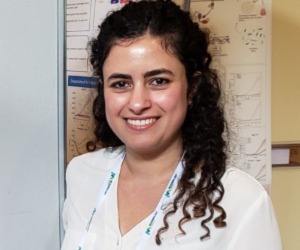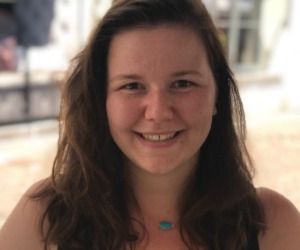Cell - Cell Communication in Bacteria 2022: Microbiology Best Poster Prize
Posted on August 22, 2022 by Microbiology Society
At the Microbiology Society's 'Cell-Cell Communication in Bacteria: Fundamental and Applied Aspects' conference the Microbiology 'Best Poster' Prizes were awarded. In this blog we meet the winners to find out more about them and their research.
Shaked Uzi: 'P. aeruginosa and S. aureus Communicate using Small Signaling Molecules in Dual-Species Biofilms'
Who or what inspired you to be a scientist?

I really enjoyed learning chemistry in high school, all thanks to my chemistry teacher, so I knew this was what I wanted to study at university. But my passion for science definitely started much earlier when my parents bought me a microscope for my 10th birthday.
What are you currently working on and what area of your research excites you the most?
In general, in our lab we investigate quorum sensing in P. aeruginosa. During my Ph.D. studies I started to go more into metabolomics, and I was amazed by the amount of information you can get using this technique. Currently, I’m applying this tool to investigate how P. aeruginosa and S. aureus communicate.
How would you explain your poster to a child under 10?
Like people communicate with words, bacteria communicate using small signaling molecules. In my research, I found one molecule that two pathogenic bacteria use to communicate. By understanding how they “talk” we can develop in the future treatment that will prevent it and reduce their virulence.
What would you be doing in your career if you weren’t a scientist?
Since I was in art school in junior high, I think being a graphic designer could have been my second career choice.
Garance Coquant: '3-oxo-C12:2, a Quorum Sensing molecule from the gut, exerts anti-inflammatory effects through a bitter taste receptor'
Who or what inspired you to be a scientist?

I have always wanted to understand how our body works and how all our cells are able to work together.
What are you currently working on and what area of your research excites you the most?
I am working on the interaction between the gut microbiota and the intestines in the context of health and disease. The interplay between micro-organisms and our own body is fascinating to me and there is still so much mystery to decipher.
How would you explain your poster to a child under 10?
I work on small molecules synthesized by bacteria to communicate with each other in our gut. I study the effect of those molecules on the inflammation of our gut during certain disease. Those molecules are able to reduce the fire and calm down the disease.
What would you be doing in your career if you weren’t a scientist?
If I weren't a scientist, I think I would be a teacher. Being able to transfer knowledge to young kids seems like a nice job.

